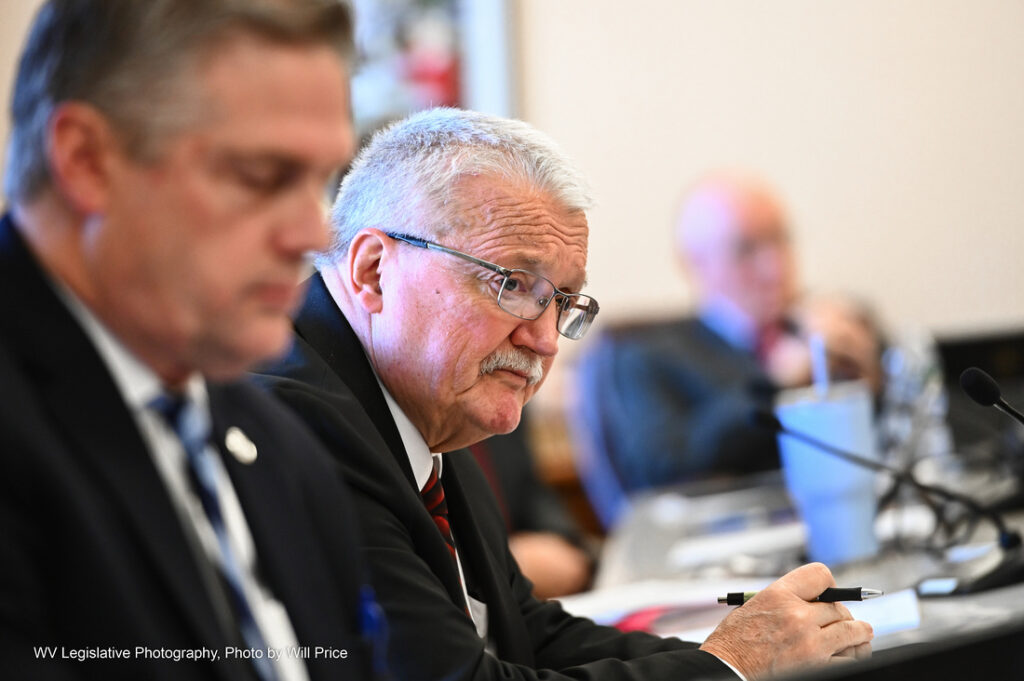The Senate Education Committee started the day off with a lively discussion of several topics, including history and hygiene.
Senate Bill 216 would require all schools to instruct students on the Holocaust and other genocides.
Although there was brief discussion around the need to define the term “genocide,” much of the debate and ensuing amendments to the bill related to concerns about government overreach into private education.
Sen. Rollan Roberts, R-Raleigh, argued the bill exacerbated an imbalance of creating requirements for secular schools, but not for homeschooling or other alternative education programs.
“What we’re adding on to I’m fine with, I have no problem,” Roberts said. “I’m thrilled, except for the forcing of the private schools to do these things when, by the way, we have twice as many homeschoolers in the state of West Virginia as we do private school students. We don’t do those things with all of the others. This is a singling out, is where I have the problem.”
Roberts proposed an amendment to strike the words, “private, parochial, and denominational” from the bill, which was adopted.
Sen. Mike Oliverio, R-Monongalia, proposed another amendment that would require all public schools to teach financial literacy.
“The basic understanding of a checking account and banking and how a mortgage works, how a car payment works; those kinds of things, I think are things that somehow some of our children are, as they leave public schools, are not prepared to have knowledge in those areas, and those are decisions they’re having to make that can really affect them,” Oliverio said.
State Superintendent David Roach testified that West Virginia schools do teach financial literacy and have for years but conceded that there is nothing in the state code requiring it be taught. The amendment also passed.
A committee substitute of Senate Bill 216 was reported to the full Senate with the recommendation that it pass.
Free Period Products
The committee also took up Senate Bill 489, which would require all county boards of education to provide free feminine hygiene products to students in grades three through 12.
In recent surveys from the Alliance for Period Supplies, a nonprofit sponsored by Kotex, more than two in five people with periods say they have struggled to purchase period products due to lack of income at some point in their life, often leading to missed work and school. The surveys also show COVID-19 has only exacerbated the issue of access.
Sen. David Stover, R-Wyoming, voiced his support for the bill. As a teacher for more than 20 years, Stover said he saw firsthand the need for period products in schools.
“What I ended up doing for the last 10 or 12 years I taught, any two or three of the female students that I knew, and knew their moms – who I probably taught 20 years earlier – I just donated for 500 bucks,” Stover said.
“I said, ‘Here’s the fund, you and your mothers figure out where this will be stored. You don’t need to do anything, we’ll kind of know when you get up and go to that particular file cabinet.’ It was a godsend that that could happen. It would be a bigger godsend because it ended up being that students from every teacher in the building would interrupt my class then. So you need to do that in a central way. This could have been done a long time ago.”
If passed, West Virginia would join 16 other states including neighboring Maryland and Virginia in requiring period products in schools.
Senate Bill 489 was also reported to the full Senate with the recommendation that it pass.
Results Of Focus Groups
At the end of the meeting, the Senators heard a joint presentation from the state’s two education employee organizations.
American Federation of Teachers-West Virginia President Fred Albert and West Virginia Education Association President Dale Lee presented some of the findings from six focus groups the organizations conducted across the state in late November and early December 2022 to collect community input on the factors that will help improve student achievement.
They reported the major finding was schools simply need more resources, closely followed by concerns of discipline, teacher compensation and academic freedom.




















